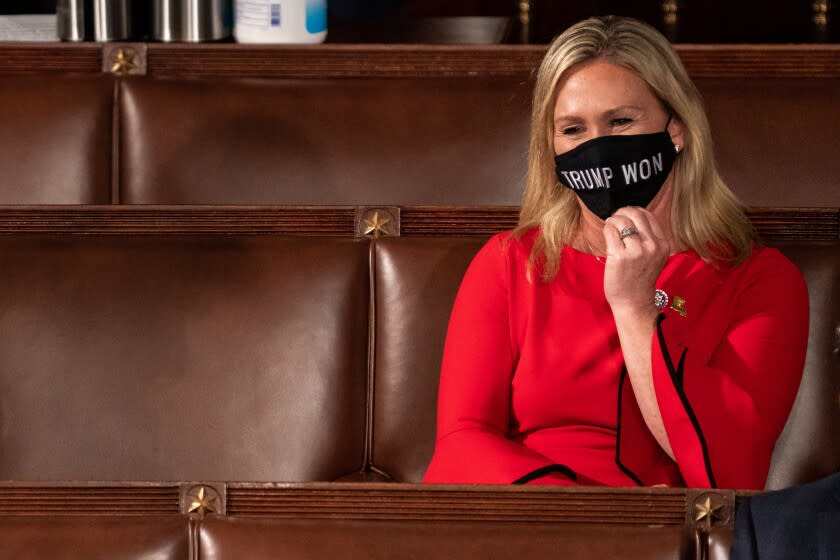In court, Rep. Marjorie Taylor Greene can't recall much about her actions surrounding Jan. 6 riot

- Oops!Something went wrong.Please try again later.
Georgia Rep. Marjorie Taylor Greene on Friday became the first Republican lawmaker to testify under oath about her actions leading up to and during the Jan. 6, 2021, attack on the U.S. Capitol, but she avoided directly answering many questions that might shed light on her role in the run-up to the insurrection.
Greene has not been accused of wrongdoing in court or by the House committee investigating what led to the riot. She immediately condemned the Jan. 6 attack and has repeatedly said she was not involved. No evidence ties her directly to the violence at the Capitol.
Still, her public testimony in state administrative court, in response to a challenge to her eligibility to run for a second term, was closely watched for potential details about events leading to the riot, including information the Jan. 6 select committee may not have because it has not subpoenaed members of Congress. Some Democratic lawmakers have accused congressional supporters of then-President Trump of giving rioters information about the Capitol in advance, though the Democrats have not provided evidence to back up the assertions.
Over several hours of testimony, Greene largely dodged the most pointed questions the Jan. 6 committee might have hoped to get answers on, saying she wasn’t comfortable responding to hypotheticals, wasn’t sure, or didn’t know.
Greene said she didn’t remember speaking with anyone, including members of Congress or the White House staff, about Jan. 6 demonstrations and whether the crowd might become violent. Asked whether she, her campaign or her congressional staff provided advice, information, funds or the promise of a public statement to anyone, she said, “I don’t remember. I don’t think so.”
Greene said her office was not open to the public and did not give tours between Jan. 3, when she was sworn in, and Jan. 6.
She said she and her staff did not provide maps or office locations to anyone before the riot.
“No,” the first-term lawmaker said. “We got the keys to our office on Jan. 3. I couldn’t find the bathroom.”
Asked whether she had urged Trump, his chief of staff or anyone in the White House to impose martial law as a way to remain in power, Greene responded: “I don’t recall.”
“So you’re not denying you did it?” the attorney asked. “You just don’t remember.”
“I don’t remember,” Greene replied.
Five voters challenging Greene’s eligibility to run in her northwest Georgia congressional district have cited a provision in the 14th Amendment to the Constitution, enacted shortly after the Civil War, that bars members of Congress from returning to their seats if they participated in an insurrection or rebellion against the government.
The voters argue that Greene’s repeated assertion that the 2020 presidential election was stolen from Trump contributed to the violence at the Capitol. Greene has called the challenge to her eligibility a stunt by her political opponents.
Her attorney James Bopp Jr. argued that the challenge is an attempt to deny voters the right to decide whether Greene should remain in office, and that the Georgia administrative court is the wrong venue to challenge her eligibility. He said the challenge should occur after she wins and is sworn in, and that Congress, not a court, decides whether a person qualifies to serve in the office.
In advance of Jan. 6, Greene promoted the day as “our 1776 moment” — a reference to the American Revolution that other GOP lawmakers also invoked. Greene said Friday she was talking about having the courage to object to the results.
Perhaps more significant is a video she posted to social media in which she accused then-President-elect Joe Biden and House Speaker Nancy Pelosi (D-San Francisco) of treason and noted that the crime carries the death penalty. The voters’ lawyer referenced a CNN article quoting the video rather than the video itself.
Asked whether she thinks Pelosi is a traitor to the country, Greene looked to her lawyer.
“I’m not answering that question. It’s speculation,” Greene said.
“Did you say these words?” the lawyer pressed.
“According to this CNN article I did,” she said.
The administrative judge will make a recommendation to Republican Georgia Secretary of State Brad Raffensperger as to whether Greene should appear on the ballot.
Raffensperger’s decision can be appealed to the state Supreme Court. The state’s primary is May 24, and early voting starts the first week of May.
This story originally appeared in Los Angeles Times.

